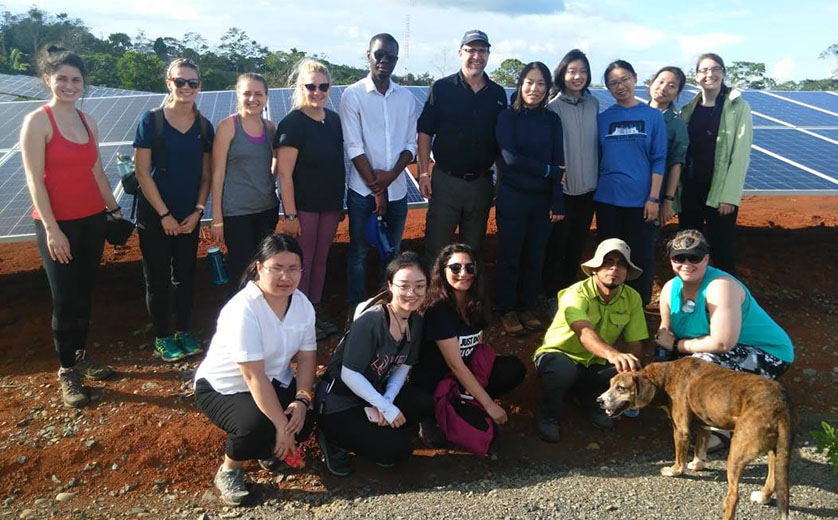Brown School students found inspiration over the summer in both Costa Rica and Uganda during transdisciplinary problem solving (TPS) courses designed to address real-world global problems in a comprehensive way.
Sustainability in Costa Rica
Sydney Gosik, an MSW/MPH student, was one of 12 Brown School students who took the 10-day class “Sustainability in Costa Rica.”
“We were provided with vast amounts of information and learning experiences regarding ecosystems, social systems, and economic systems within Costa Rica,” Gosik said. “This course went way beyond information sharing and really drew upon my critical thinking and analytical skills. We routinely put the concepts into a global context. Without thinking, I was synthesizing new information into new ideas for how I want to view the world and practice as a professional.”
The TPS class is led by Joe Steensma, associate professor of practice.
“In the course, we were able to delve into sustainable power,” Steensma said. “Costa Rica is 100 percent fossil-fuel free. I think students were really inspired by that. They start got to understand the economics of hydroelectric and solar power, but also the ecology.”
Large swaths of land in Costa Rica have been turned into forest to capture carbon, generating power without a carbon footprint.
“Seeing the biodiversity is an eye-opener,” Steensma said.
The course partnered with Earth University, a 25-year-old institute in Costa Rica, where students study tropical agriculture and develop methods that can be sustained for hundreds of years to feed the world’s people. Brown School students worked side by side with the Earth University students on the university’s farm as part of the course. The co-instructor was Ivan Castillo Gomez, director of ecology at Selva Verde, an eco-lodge where they stayed. Students also visited a community-managed fishery.
In their journals, students highlighted the key learnings they’d take back to home to use in their future coursework and practice.
Tracy Liang, an MPH student specializing in Epidemiology/Biostatistics, said she would highly recommend the course. “The most valuable study activity was the daily reflection and discussion,” she said. “We were encouraged to share ideas which deepened our understanding, and I was inspired a lot by the discussion.”
Partnering with NGOs in Uganda
Another innovative TPS summer course was “Working with NGOs to Address the Intersection of Child Labor, Poverty, Gender, and Health in Sub-Saharan Africa.”
Based in Uganda, it was a collaboration between the Brown School’s International Center for Child Health and Development (ICHAD) and SMART Africa Center, and their many partner organizations in Africa. The various institutions and organizations that hosted the students included the Uganda Parliament, Childfund, and the Uganda Youth Development Link.
The 10-day course provided students the conceptual and practice skills they need in working with international governmental and non-governmental organizations and advancing social development within sub-Saharan Africa. Specifically, it sought to help students interested in issues such as poverty, child labor and HIV/AIDS to understand the practitioner’s role in planning for, developing and administering non-governmental organizations. Students were also encouraged to come up with innovative ideas to address challenges.
The class was led by Fred Ssewamala, William E. Gordon Distinguished Professor, who established ICHAD. He is also the director of the SMART Africa Center, aimed at reducing gaps in child and adolescent mental health services and research in Ghana, Kenya and Uganda.
“As much as you try to prepare students in the classroom, many are not prepared for what they find in the field, especially in global work,” he said.
Students are taught cultural competence, but seeing it in action on the ground can be challenging, he said. “The level of poverty they saw, many have never seen, so it’s hard to prepare students for that. But the practical pieces are just as important as the classes. The classroom by itself is not enough; there’s a need to get out there.”
Many of the students had not been out of the U.S. Some of the students were overwhelmed by the receptivity of the Ugandan people and the NGOs that Ssewamala has worked with for more than a decade.
Deja Miles, a first year MPH student, was one of those students.
“Seeing the organizational strategy utilized to serve so many native Ugandans living and thriving despite their HIV or AIDS status presented a newfound sense of hope,” she said.
An African-American from St. Louis, her first trip to Africa was both enlightening and fulfilling.
“I was always the minority and for once, I was nearly the same. A sense of belonging filled me and for a moment, I felt at home.”
Jianrong Zhang, MPH ’19, said his experience in Uganda had helped him realize the relationship between education and poverty, one that also exists in his homeland of China.
“My country, China, actually has also experienced considerable issues related to poverty, health, gender and education over time,” said Zhang, who has returned to China, where he is a physician. “China should aim to contribute to shared development with other countries like Uganda and the United States.”
